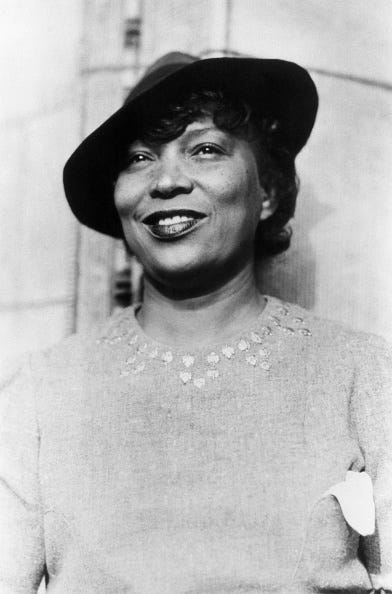"The Snowshoe Hare" by Mary Oliver, from New & Selected Poems. © Beacon Press, 1992.
ORIGINAL TEXT AND AUDIO - 2012
On this date in 1610, Galileo wrote a letter describing his discovery of three of Jupiter's moons. He had recently made some improvements to his telescope, and he discovered them in December. As he continued to observe them over the next few months, a fourth celestial body appeared, and he realized that they were actually orbiting the giant planet. Since most people at that time still believed in the Ptolemaic theory — that the Earth was the center of the universe and everything revolved around us — it was an important discovery. It went a long way toward confirming Copernicus's controversial theory that the Earth went around the Sun.
Today is the birthday of Zora Neale Hurston, born in Notasulga, Alabama, in 1891. She grew up in Eatonville, Florida, the first incorporated African-American community in the United States, with a population of about 125. Hurston loved it there, and would set many of her stories in Eatonville, depicting it as a sort of Utopia; she also described it in her 1928 essay, "How It Feels to Be Colored Me." When she was 13, her mother died, and her father remarried immediately, so she was sent to a boarding school in Jacksonville, Florida. She was expelled when her father stopped paying her tuition, and she went to live with a series of family members.
She went to Howard University, and cofounded the school's newspaper, The Hilltop. She was offered a scholarship to Barnard College, where she studied anthropology, and she was the college's only black student. She published many short stories in the 1920s and early '30s, and her first book, Mules and Men (1935), was an anthropological study of African-American folklore. She's best known for her novel Their Eyes Were Watching God (1937).
A founding member of the Harlem Renaissance, Hurston died in poverty in 1960 and was buried in an unmarked grave. In 1973, novelist Alice Walker and literary scholar Charlotte Hunt found an unmarked grave in the cemetery where Hurston was buried, and marked it as hers. Alice Walker wrote about the event in her article "In Search of Zora Neale Hurston" (1975), and the article sparked a renewed interest in Hurston's writing.
It's the birthday of novelist William Peter Blatty, born in New York City (1928). His novel The Exorcist (1971) just celebrated its 40th anniversary, and has been released in a new edition with additional material.
Today is the birthday of publisher Jann Wenner (1946), born in New York City. He was sent to boarding school in California when he was 11, and his parents divorced when he was 12. Neither of them seemed particularly interested in gaining custody of their son. He went to the University of California at Berkeley, dropped out in 1966, and got a job at the left-wing political and literary magazine Ramparts. The following year, using $7,500 that he borrowed from his family and his future in-laws, Wenner cofounded magazine with San Francisco Chronicle jazz critic Ralph J. Gleason. It was a biweekly magazine that focused on rock music, and they called it Rolling Stone.
It's the birthday of novelist and nonfiction author Nicholson Baker, born in New York City (1957). He grew up in Rochester and went to an experimental "School Without Walls," where students studied only what interested them, didn't receive grades, and typed up their own transcripts. "At the time I thought: Give me structure!" he told The New York Times. "I yearned for a more traditional school. But now I think it was the best thing. I learned what it was like to be incredibly bored."
His first novel, The Mezzanine (1988), is an account of one man's random thoughts as he rides an escalator up to the mezzanine level of his office building on his lunch hour.
Baker has earned a reputation as a writer of erotic novels: Vox (1992), The Fermata (1994), and House of Holes (2011). He's also published a book about World War II Human Smoke (2008), a memoir about his admiration for John Updike U and I (1991), and an impassioned critique of the use of technology in libraries Double Fold (2001). The unifying characteristic in all his diverse books is his eye for minutiae.






What Zora Neale Houston did was amazing